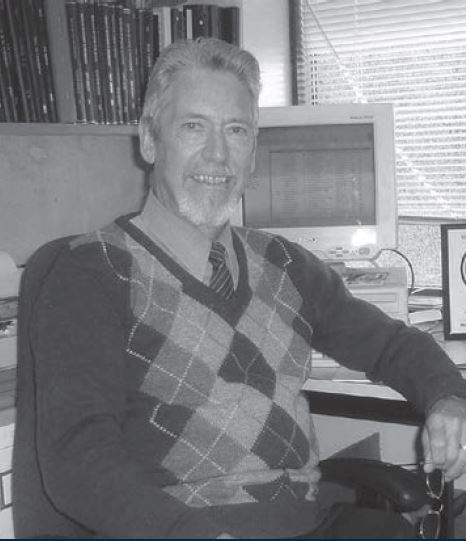
Physiology News Magazine
Obituary: Joseph Davison
1942 – 2013
Membership
Obituary: Joseph Davison
1942 – 2013
Membership
Ashley Blackshaw, David Grundy & Keith Sharkey
https://doi.org/10.36866/pn.92.52

It is with sincere regret and sadness that we announce the death of Joe Davison. Joe was an outstanding researcher, teacher and mentor. He made important contributions to our understanding of the neural control of the gastrointestinal (GI) tract and its accessory organs. Through his trainees, Joe has had a profound influence on autonomic neuroscience and GI physiology. He continued his career until shortly before his death with a sense of purpose and tenacity, and remained a champion of neurogastroenterology nationally and internationally.
Joe was born in Northumberland and began his scientific career in the UK completing a PhD at the University of Newcastle in 1969 under the supervision of the late Brian Schofield. Davison and Schofield worked on the vagal and enteric control of acid secretion. Joe demonstrated cholinergic and non-cholinergic enteric neuronal reflex pathways in the control of acid secretion. These studies were important as they showed how vagal and enteric control of acid secretion had distinct components and also where they overlapped. A short fellowship in Bristol allowed Joe to develop and pioneer vagal afferent recordings. He continued this work as a lecturer in physiology when he went to the University of Dundee in 1971. In Dundee, Joe’s influence on future leaders began. His trainees included David Grundy and Geoffrey Pearson, both of whom have gone on to highly successful academic careers in the UK. Grundy and Davison made pioneering observations on the cardiovascular consequences of vagal afferent activation and, better known, the modulation of vagal efferent discharge by gastric distension and contraction. In this paper, they postulated a reciprocal control of antagonistic vagal motor neurons that innervate the stomach. With Geoff Pearson, Davison moved from his work on neuronal mechanisms in the control of the stomach to consideration of the neural control of the pancreas. The culmination of these studies was a highly significant paper in Nature (1981) that showed excitation of the non-cholinergic nerves of the pancreas stimulates amylase secretion by a different intracellular coupling mechanism from that activated by cholinergic nerves or by cholecystokinin (CCK), gastrin or bombesin. Whilst in Dundee, Joe also studied the sensitivity of vagal afferents to chemical and mechanical stimuli that also included the earliest recordings of the action of peptides such as CCK on vagal afferent terminals (with G Clarke).
In 1982, Joe left the UK being recruited as Professor and one of the first ‘Medical Scientists’ of the newly created Alberta Heritage Foundation for Medical Research (AHFMR) to the University of Calgary. In Calgary, he continued pioneering studies of both secretion and neural control mechanisms throughout the GI tract. In Calgary, Joe made important observations on gallbladder motility (with Eldon Shaffer), continued studies on non-cholinergic control of pancreatic and salivary secretion and continued with themes of neuronal circuitry in GI motor and secretory control in general. Again, one cannot overstress the importance of his laboratory as a permissive environment for trainees. Joe’s trainees in Calgary included Mary Perdue, Beverley Greenwood Van Meerveld, Christine Bear, Fiona Boissonade, Bengt Gustafsson, Ron Mathison, Gillian Shillabeer, Kathy Fraser (Reynolds) and Keith Sharkey. All of them have gone on to successful faculty positions in Canada, the UK, Sweden and the USA. In total, three of Joe’s trainees have gone on to win Janssen (Master’s) Awards at the AGA, illustrating well the nature of Joe’s impact on the field.
In Calgary, Joe’s scientific contributions continued unabated. He made important theoretical and practical contributions to the field when, in 1984, he published an account of the innervation of the GI tract in a book edited by J Christensen and D Wingate. In this chapter he outlined how the hierarchical innervation of the gut worked, including important observations on vagal and sympathetic control. These concepts are now fully incorporated into the field, and appear in textbooks and teaching materials. In a long- standing collaboration with R Mathison, Joe discovered and patented a series of novel anti-inflammatory peptides derived from salivary glands.
In his later years, Joe made important contributions to Australian Neuroscience. With Ashley Blackshaw and his PhD student Penny Lynn he helped develop techniques to record from murine colonic afferents which led to a number of novel findings. On subsequent visits to Australia, working with Gino Saccone, Joe became part of his lab at Flinders University, and brought together a team, again pioneering recordings from afferents in vivo and in vitro, this time from the pancreas. Together these projects generated the concept that pain sensing fibres were consistently found on blood vessels, not in ductal or gut tissue.
Taken together, Joe has had a very significant impact on the development and growth of digestive sciences in Canada, the USA, Australia and the UK through his many and varied research contributions and by providing an outstanding training environment. Throughout his career he published over 180 peer-reviewed papers and about 50 book chapters and reviews.
Beyond his contributions to research, graduate and postgraduate education, Joe held leadership positions in Canada and internationally. He was Head of Physiology at University of Calgary for 10 years (1988-1998), Chair of Canadian Council on Animal Care (2004-2005), Co-Editor of the Canadian Journal of Physiology and Pharmacology (1991-1998), Chair, International Society of Autonomic Neuroscience conference (2003), and on the editorial boards of a number of prominent journals, including the Journal of Gastrointestinal Motility and The Journal of the Autonomic Nervous System.
Joe is survived by his wife of over 40 years, Mary, his two children, Sara and Christopher, and four grandchildren.
In Joe’s memory, the Dr Joseph S Davison Memorial Scholarship has been created at the University of Calgary to assist graduate students in gastro-intestinal physiology. Donations may be made online at https://netcommunity. ucalgary.ca/davisonaward
